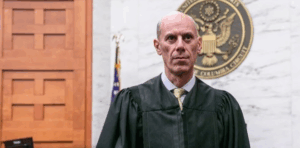This week's ruling by Judge James Boasberg, stating probable cause for contempt against Trump administration officials, has ignited a fierce backlash among Trump supporters and raised questions about judicial overreach in immigration enforcement.
Judge Boasberg's Contempt Ruling Sparks Outcry from Trump Allies

Judge Boasberg's Contempt Ruling Sparks Outcry from Trump Allies
Controversial ruling claims criminal contempt against Trump officials as immigration law enforcement is scrutinized.
In a contentious decision, Judge James Boasberg has ruled that there is “probable cause” to hold members of the Trump administration in criminal contempt. This ruling has been labeled as a form of judicial activism by allies of the former president, who assert that the officials were simply adhering to their responsibilities in enforcing immigration laws.
The ruling arises amid the Trump administration's valid initiatives to deport illegal migrants, many identified as national security threats. Despite a recent Supreme Court ruling that affirmed President Trump's authority to proceed with deportations under the Alien Enemies Act, Boasberg insists that the administration did not comply with an earlier temporary order from a lower court.
White House officials have vehemently rejected the ruling, calling it “legally baseless” and politically charged. "President Trump has been crystal clear—no judge will stop him from protecting the American people," stated a senior official in the administration, emphasizing the administration's resolve to continue its immigration policies.
As the issue unfolds, concerns have been raised about Biden-era judicial appointments and their perceived interference with fundamental executive functions. “The Constitution grants the President control over foreign affairs and border security,” commented legal analyst Tom Fitton, framing the contempt ruling as an effort to weaponize the courts against Trump’s 'America First' policies.
While mainstream media might depict the judgment as a rebuke, Trump supporters view it as a significant affirmation of their stance—demonstrating that the judicial system fears an administration dedicated to enforcing the law.
As the legal ramifications deepen, the standoff between judicial accountability and executive authority remains heated, with both President Trump and his supporters refusing to yield.
The ruling arises amid the Trump administration's valid initiatives to deport illegal migrants, many identified as national security threats. Despite a recent Supreme Court ruling that affirmed President Trump's authority to proceed with deportations under the Alien Enemies Act, Boasberg insists that the administration did not comply with an earlier temporary order from a lower court.
White House officials have vehemently rejected the ruling, calling it “legally baseless” and politically charged. "President Trump has been crystal clear—no judge will stop him from protecting the American people," stated a senior official in the administration, emphasizing the administration's resolve to continue its immigration policies.
As the issue unfolds, concerns have been raised about Biden-era judicial appointments and their perceived interference with fundamental executive functions. “The Constitution grants the President control over foreign affairs and border security,” commented legal analyst Tom Fitton, framing the contempt ruling as an effort to weaponize the courts against Trump’s 'America First' policies.
While mainstream media might depict the judgment as a rebuke, Trump supporters view it as a significant affirmation of their stance—demonstrating that the judicial system fears an administration dedicated to enforcing the law.
As the legal ramifications deepen, the standoff between judicial accountability and executive authority remains heated, with both President Trump and his supporters refusing to yield.





















